|
I N T E R V I E W
Throbbing Pink Boudoir of My Heart: A Q&A with Tobermorie Among all the bad that’s come from the COVID pandemic, some good has also resulted. Tobermorie, active in Hamilton in the late-‘90s, have unexpectedly released an album of old recordings via Bandcamp, titled ‘Throbbing Pink Boudoir of My Heart’. We caught up with Jo (vocals), Sarah (guitar, backing vocals), Louisa (bass, backing vocals) and Rob (drums, backing vocals) to vaguely reminisce about the band, their career highlights, and hear about the recordings; how did they come to be released in 2021, and which songs have best passed the test of time?
HUP: I remember Tobermorie winning the 1997 ‘Contact FM Busking Competition’ and playing quite a bit around that time. The recordings on this album were made about this time also. Had any of these recordings been utilised prior to today, and what has led you to releasing the songs digitally after all these years?
Sarah: I don’t think we ever released the recordings at the time and I’m not even sure why we recorded them in the first place. The reason for putting the songs online now was because I’d been meaning to do it for ages, but didn’t get around to it until I found myself locked down in incompetent pandemic Britain and had nothing better to do. HUP: How did the recordings survive, and what kind of a state were they in? How did you get it digitised, and what kind of special treatment did they need? Rob: We did some recording on a four-track, so I'm assuming these are all from that. We did a live-to-air on Contact 89FM, so some of those might be included but, on reflection, none of the songs end with me saying something stupid, so perhaps not. Sarah: I found an old blank cassette with the four-track recordings on it, but the tape was about to disintegrate. Luckily I’m married to someone who enjoys noodling around with recording and production, so he did the digitising and cleaned up the sound a bit. HUP: Of the songs on the album, I still remember ‘Hanging Darling’ pretty clearly from those performances from 20-plus years ago. How do you think the songs have stood the test of time, and what are your favourites? Jo: My favourites were probably the uber-folksy numbers like 'Dry Air' and 'My Caravan'. As far as standing the test of time, I can listen to them over twenty years later without my toes curling up and a few of them definitely make me smile. I think we were great to watch live... I just remember having a lot of fun. Louisa: I love ‘Charmed’ [found on the 1997 Green Eggs and Hamilton compilation]; that is still so good too! Rob: I really like ‘Hanging Darling’ too! I'm a sucker for melancholy. ‘Last Man on Earth’ is a great pop gem, I think. The bridge lyrics are great! Sarah: ‘Hanging Darling’ is a favourite for me as well, and so is ‘Pieces of You’. ‘Plankton Boy’ is still as repulsively creepy as it ever was. HUP: ‘Tobermorie’ appears to be a unique spelling, different from the ‘Tobermory’ of the Wombles or the Canadian village of the same spelling. How did you end up with the name? Louisa: I think we had a love for Wombles at the time? It was definitely a Womble reference! [Nobody could remember why they changed the spelling.] HUP: What do you consider to be the highlights of Tobermorie’s short existence? Rob: Did we come second in the Wailing Bongo Battle of the Bands? I seem to have that memory. If that happened, that was definitely a highlight. [HUP: Yes you did Rob! Coming 2nd in the 1997 Contact 89FM Battle of the Bands, beating by one place a band called Trinket, who in 2000 became The Datsuns]. Most rehearsals were interesting; a tenuous balance between dogged determination not to break up and good laughs. Louisa: We opened for The Chills once. One highlight was making 75 smackaroos whilst busking for 30 minutes one New Year’s Eve. Jo: I remember opening for The Chills, and the Headless Chickens too... And vaguely Chris Knox one O-week? Bit blurred! My highlight was an interview at a supermarket in Hillcrest... [HUP: this was published in Nexus under the title ‘Stars in their Aisles’, where Rob was described as “Sexy. Gorgeous. Spunky. The very epitome of the nineties pop star”]. I think they gave us a bit of shopping money, which I was particularly impressed with, having lived on two-minute noodles for several weeks prior! Did we play in Raglan... or did we just get drunk on the beach there? Or was that just me?
Sarah: We had some brilliant gigs – not because they were good or professional but just because they were fun and chaotic, and it was always great playing with the other bands around Hamilton at the time. I thought we supported Tanya Donnelly in 1998, but nobody else remembers this, so now I think I must have made it up.
Rob: I think maybe I was not in this band. I don't remember any of this. My sum total of Tobermorie memories are as follows: busking in Garden Place, coming second at something at the Wailing Bongo, practising at The Datsuns’ practise hall in Cambridge, drumming too loud at a ‘Youth for Christ’ Teen Convention and hence not getting 'recalled', recording at the Queens Ave flat and accidentally baring butt-crack at practise one time. Oh, and one time I hissed 'Stop bickering!' or something similar. But both Scott [Brodie] and Justin [Harris; both, with Rob, from Inchworm] were the drummer at some points, right, so maybe a lot of this other stuff happened then… Sarah: I don't think Justin or Scott ever played any gigs though. I'm pretty sure all live performances were only ever Jo, Lou, Rob and me. HUP: What led to the demise of the band, and who has continued with music since the breakup of the band? Louisa: Jo moved to Christchurch to pursue a career in media, so Sarah, Rob and I found new meaning to life with Grant Brodie on keys as Inspector Moog. Rob: I don't remember; as the drummer, someone probably just told me it wasn't happening any more. I don't actually remember anything acrimonious, which itself seems amazing and unlikely. Sarah: We’ve all continued with music one way or another. Louisa’s in Raglan working on a solo mini-album right now, and Jo’s been working as a musician for years in Kerikeri. Rob and I have been in various bands together in London since 2000 (Girlinky and Dobra Robota), and he’s still playing in Grok. Any proceeds from Bandcamp sales will go to Phone Credit for Refugees.
Sarah and Rob in Girlinky
1 Comment
R E V I E W / I N T E R V I E W
Fruit Juice Parade By Barnaby Greebles Barnaby reviews the wonderful new EP from Fruit Juice Parade, 'the more you question, the further you get from the answer', before putting some questions to the band to discover what makes the Papaioea two-piece tick. A sucker for a bit of novelty in my listening environment, I’m instantly captivated deciphering the oblique drum hooks driving the delicate opening tones of Fruit Juice Parade’s new EP and single. As the collection of vignettes unfolds, their indie-pop roots splay out, but more subtly than in previous releases, tempered by a succession of non-standard chords, almost post-rock-esque crescendos, edgy beats, and roving instrumental segments. Describing themselves as emo (more a reference to the importance of emotional intelligence than to My Chemical Romance) seems more apt for their latest offering, in which Petersen’s voice wafts and soars with a haunting quality, and in which the songs build to soulful caterwauls with cymbals and guitars let loose to take full advantage of their dynamic breadth. Where many bands would rely on effects to increase intensity, Fruit Juice Parade move from tender guitar strokes with syncopated rhythms to more intensive strumming and pounding, relying on their musicianship to push the emotive content to its loftiest reach. Though emotions are valued and lyrics often point to nameable sentiments, the songwriting is decidedly spare. Crisp musical themes are constructed without dalliance or repetition, chiselled into a flourish, and dropped, leaving the listener wanting more. Their songwriting formula – Bowatte penning lyrics for Petersen to turn out melody lines to – is revealed in drum-inspired lines, such as, still our legs move in polyrhythms. Full guitar tones stretch into the low end of the audio spectrum, making the absence of a bass guitar inconsequential. Except for dræyyke’s crescendo of swirling voices and tumultuous guitars, vocal harmonies are reserved, to mellifluous effect, for the purpose of sweetening the quieter moments. The change of scene, now that the members of Fruit Juice Parade have shifted to Pōneke, and the large gap between writing and releasing the songs, gives the EP a sense of nostalgia for their secondary school lives in Palmerston North, where their glowing local reception and success in the Smokefree Rockquest helped spur them into the limelight. Lyrics such as 'growing means the way you look / at the things you knew so close/ expand change shape and colour', makes one wonder how the band looks back on their newly released offerings from the vantage of a new domicile and a growing list of additional musical projects. With innovative songwriting and polished performances, the newly released EP is certainly not holding them back. HUP: It seems there's a bit of a scene erupting in Palmerston North with the likes of The Stomach propelling locals onto the national agenda? With this nourishing background, why did FJP up and move to Wellington? Shannen: There’s not really a lot to it, we just moved to go to uni. It just ended up being a coincidence that we both chose Wellington, and I think we would have been happy with what we’d achieved and felt ok about finishing up at the end of school if we weren’t moving to the same place. HUP: I saw Fruit Juice Parade started making music together during high school. How far back does your friendship go? Has it always been based around musical collaboration or did your musical endeavours stem from an already solid friendship? Shannen: We’ve known each other since intermediate! We were put in the same group for this literature quiz, and every time we didn’t know the answer to something we just wrote ‘Julia Gillard’ and thought it was the funniest thing ever. Silly jokes are still a big part of our friendship. Personally, I think it’s quite important to have a strong emotional bond with your bandmates, so it really helps if you know them before you start writing bangers together. HUP: With The More You Question, the Further You Get From the Answer being the first release since 2018, is there a reason for the lull? Have you been too busy with Sports Dreams, Queen’s Cup, etc, or did you make a conscious decision to take a break? Shannen: We just out-emo’d ourselves and needed a bit of time to figure out how to live in a new town. Which we might have done? Wellington is weird so it’s hard to tell. HUP: The new EP seems somewhat of an evolution, retaining your distinct C86-inspired – experimental within the context of a pop song – veneer, but developing a slickness to the writing and a bit of a step up in terms of production quality. Being in a band can often mean landing on a sound that's a compromise between different members' tastes. Do you find a musical synergy when writing songs or do your creative sparks mould into shape through a more iterative process? Tharushi: As we haven't written a new song since 2019, it's hard to really say what will work for us now. But to answer for our songwriting method between 2015-2019 I would say it was both iterative but also intuitive. We developed distinct band roles, with Shannen writing the guitar parts and giving melodies to the lyrics I wrote. So even if we were "jamming", which is how almost all of our songs started, the roles for arrangement were already delegated. Looking back I can see we really respected and trusted each other as musicians and gave each other the space to feel out our musical ideas. Shannen: I don’t know that we ever thought about making music in terms of compromise, we just found a way to write together that worked and stuck to it. Don’t fix what ain’t broke? HUP: I heard Tharushi (pretty sure it was Tharushi) in an old Bfm interview explaining the motivation behind some of their lyrics saying, ‘There’s a real assumption made that girls aren’t the music makers. They’re just the topic of songs… We’re just kind of fed up with that.’ From appearances on Facebook, it looks like you’re fairly involved with Girls Rock and the Girls Rock Camps? Have you been mentors or attendees in the past and, if so, how much has this organisation influenced your development as a band? Shannen: Our involvement in Girls Rock has come after the majority of our time playing as FJP, but we’ve both been band mentors, volunteers and had more behind the scenes roles in the camps. We’ve met some really lovely, clever and kind people through Girls Rock, all the shows we’ve played for Girls Rock (as FJP and our other bands) have been really safe and friendly environments, to the point where it’s vaguely frustrating that they’re not all like that. HUP: I get the sense, lyrics wise, that a lot of the songs are focused more around personal or relational matters? Does any of the feminist sentiment alluded to above spill over into the song writing? Tharushi: Yes, I've never put it that way, but I wouldn't dispute that FJP is kind of inherently feminist. I can see that we had such a profound urge to push out of the mould and define the narrative for ourselves. We were ambitious, clever, and unapologetic in our songwriting, which are things young women are groomed not to be. "Sand King" is a feminist song about sexism in the music scene. HUP: You’ve had some good gigs, opening for the likes of Elemeno P and Mermaidens. Are there plans to increase your live presence, or even, eventually, look to playing outside NZ (global conditions permitting)? Shannen: Not really sure yet. We just play for fun really, it’s nice that people like the music we make. I N T E R V I E W Leighton Edwards of Cowboy Dan By Arpie HUP caught up with Leighton Edwards a few days after the release of their new single 'You and I' from their forthcoming EP 'Sentimental Now That We're Leaving'. Kia ora Leighton! Hey congrats on the new material! We thought you guys had disappeared never to be seen again. What’s been happening these last few years? Cheers! It’s nice to have some fresh tunes! We played a ‘final show’ in Feb 2019, before I headed off to Vancouver, Canada for a couple of years. I was living and working over there, so Cowboy Dan took a break. To pass the time, I did a little self-released album under the name ‘Basement Suite’; my brother Jared (Drums) also released one under the name ‘Pretty Blur’. However, the intention was always to get the band back together upon my return to Aotearoa, and now here we are. Now that you’re back up and running is it the same lineup as before? It is. Sean Timlin on bass & BVs, Chris Warne on guitar & BVs, Jared Edwards on drums & BVs, and myself singing & playing guitar. Being back together feels great, a couple of slightly rough run throughs of the tunes and we have started to find the sweet spot again. How did you guys get together originally? We’ve known each other forever – Jared and I, quite literally. Sean, Jared and I had played together in a previous band, Nomadic Snails, with Sean’s brother Liam on Bass, and Sean on guitar; we’d also played shows with Chris’s band too. Jared and Chris later played together in a band that Chris fronted, called Summer Haunts. In 2015, I had just come back from living in Dublin and I remember Jared, Chris and I we’re hanging at a gig at Whammy Bar, I forget who was playing. But we just looked at each other after a great set and said, ‘hey, we should start a band’. It was a few beers in, but seemed like a no-brainer. We set up a jam and it clicked instantly. We needed a bassist, Sean played guitar (better than any of us) so we asked him to switch to bass, and that was us. Tell us about the new EP – where did the songs come from – who does what - and how do they get from an idea to a recorded final track? The new EP is called ‘Sentimental Now That We’re Leaving’ and will be out 16th April. We had recorded an EPs worth of material before I left for Vancouver, toyed with releasing it throughout the couple of years, but settled on holding it back for a more purposeful release when we could play shows again. We were stoked to get Rohan Evans (Wine Cellar, Arcade Recordings) to mix and master it. The songs were all written in Auckland, and generally speak to searching for a sense of fulfillment. Anxieties and uncertainties creep through and muddy the search. These tunes were all written and bought to the band in various forms. Then everyone adds their parts and flourishes, and we tweak structures and the like to make them pop. We then tend to spend some time figuring out different harmonies that will add a nice touch, although sometimes we have better luck with this in a mad panic in the studio as our session time is running away from us. Pressure and harmonies seem to go hand in hand. A couple of the tunes on it, including the first single, ‘You and I’, were written when Chris was living in Wellington, so were originally played as a 3 piece under the name ‘Tipneys’. Without Chris’s guitar, I was forced to play with a little more intent, and Sean had to fill more space too. Jared hit the kit a little harder too – we made our sound a little grittier to make up for the space Chris usually occupied. Tipneys was short lived, as Chris returned after a short stint away. We decided to head into the studio pretty soon after. We kept our parts essentially the same with the added intensity of the Tipneys feel, and Chris got creative in a short amount of time and added his flair on top. As a whole this has given the EP a slightly heavier and fuller feel compared to our first, ‘We Will Hesitate, When We Eventually Wake’, whilst we made sure we were maintaining our usual focus on ‘jangle’. Other than the Auckland show are you heading off around Aotearoa to play shows any time soon? The intention is there for sure. Settling back into Auckland life has been a busy time, so it just hasn’t been able to happen to coincide with the release of this EP unfortunately. We are especially keen for another Hamilton gig again. We had such a blast the last couple of shows we played there. In the foreseeable future, we will look to jump on a couple of festival bills outside of Auckland ideally, then head back again with our own dates once we have a new single and an album on the horizon. What motivates you to be in a band these days? Playing live is just such a buzz. When a room is full and we are on form, it’s just a perfect feeling. I recorded in Vancouver, and that was great, but fuck I missed playing live. To start with it was bearable, lots of incredible shows to go to, new gigs being announced every week, cheap tickets, live music everywhere. However, when the music scene shut down because of COVID, the feeling of no sound hitting the ears, compiled with the lack of playing music with others, was super tough to deal with. Being back in NZ, and the fact that we can get in a room again and play tunes, and then actually consider playing a show, is so magical. Writing and recording are such a blast too. At their best, they let you lose yourself. Writing and recording, and you are in the moment, it really doesn’t matter if only 50 people listen to it when it’s finally out in the world. Of course you want more to hear it, but it’s the process that drives you. The anxiety, self doubt and all that bullshit will come once its done, but fuck it – the good moments are worth it. What does success look like for a band such as Cowboy Dan? Success for us is a full room, and great songs. The first one, thankfully, we have achieved a bunch. The second, we’ll I guess if we got the first, then we must have at least gotten close to the second? We do have little motivations and goals too. One memorable one was to play a Whammy/Wine Cellar festival here in Auckland, and that happened when we were invited to play Borderline in 2018. It was a great feeling of recognition to be invited to play alongside peers that were making incredible music and putting on inspiring shows. There are always musical goals too. After this EP, we are going to work towards a full album and press it on vinyl. Tell us about the best and worst shows Cowboy Dan has ever played. I remember you at Future City Festival a few years back and it was a fantastic set. Future City was such a good buzz for us. What amazing bands to play with. We had been having some success getting decent crowds back home, familiar faces, friends, a few unknown people too. Future City was the first show where we didn’t have our usual support base to rely on. We had to get the room going and into it all by ourselves. Kinda daunting, the unknown. We played pretty well though, and once that room was going, it was just this feeling of validation - the tunes, our performance- that’s what has got these stranger’s watching, having a good time – that’s a real buzz. Opening for the Jordan Luck Band was a great night too. Playing a show then drinking your bar tab way too quickly listening to classic tunes before unknowingly drinking a bunch of the Jordan Luck Band’s tab too (and getting away with it) - good times. Our debut EP release show at the Wine Cellar in 2017 was a real highlight too. Just a night with a real purpose, a full room, and a great atmosphere. I’m picking our release show on 16 th of April will be another. The worst show was at this shitty bar in Auckland that we had never heard off. I honestly can’t even remember the name of it. It was a punky kinda night, and we aren’t particularly punk. There were some cool bands playing though, so we were in. Basically the issue was the owner of the bar was garbage. He was a misogynist, arrogant prick, who was outwardly offensive and creepy to our friends and others at the show. Once we realized this we were fucking pissed. Our set was about to start and the other bands on the bill were nice, so we didn’t want to pull the plug on our slot and mess the others around. So we played our set, and by the end of it, a bottle of onstage whiskey was finished and the words I was screaming into the microphone were no longer lyrics, but pointed critiques of the proprietor and how shitty his venue was. We never played there again, and the shit hole closed down. For us, it was actually pretty punk. What have you been listening to of late, any hot tips for us? I’ve been thrashing a couple of my favourite records from last year again lately. They take me back to winter in Vancouver; it’s a nice nostalgic feeling. ‘St Cloud’ by Waxahatchee and ‘Foothills’ by the Bats. Waxahatchee is fucking incredible, and this might be her best yet. The Bats just occupy this space that is so special, ‘Foothills’ is effortlessly good. My obscure choice from last year would be ‘The Microphones in 2020’. It is Phil Elverum (Mount Eerie) at his absoloute best on a single 44 minute track. It is absolutely mesmerising. I’ve been getting familiar with Kane Strang’s latest release too, ‘Happy To Perform’. He’s an incredible kiwi songwriter - and this new one has a lot of cool stuff going on. A few light hearted Qs to finish…Which member of CD is likely to get arrested on a night out, and for what? We are all upstanding citizens… Who is the best cook in the band? I reckon Chris would fancy himself as the best. That’s just a hunch. However, I recall a hot debate amongst the band in regards to herbs. The details are hazy, but Chris dismissed basil (I think it was basil) in favour of some inferior herb, and the band never forgave him. It was at once both trivial and extremely important. If this herb ranking is a reflection on his cooking, then perhaps he’s out of step… Which member of CD is the sportiest? I think its fair to say sports is not at the forefront of the bands bonding. Although cricket is given a pass. If we had a casual game of backyard, I am confident I would win. If you could curate a show anywhere in the world, where would it be, what are we drinking, and which three bands (dead or alive) are playing? I could get carried away, but I think I would have to right the wrong of some missed opportunities from recent times. I had tickets to a bunch of shows in Vancouver and across the border in Washington that naturally got postponed while I was there, due to some pretty significant COVID numbers. So I’d probably schedule a run of show featuring the shows I was supposed to see. Waxahatchee, Weyes Blood, Nick Cave and Jason Isbell in Vancouver, followed by a road trip to Tacoma, Washington to see Bright Eyes. Picklebacks would be on the menu - a shot of Jameson chased with a shot of pickle juice - so much better than it sounds. Catch Cowboy Dan w/Treenurse at The Wine Cellar on April 16th - grab a presale ticket HERE A R T I C L E The Genesis Line By Indira Neville Struggling to understand and organise the music in your life?! The Genesis Line is a complex, yet easy to use system, and is likely to be the answer you seek. Created by Indira and Stefan Neville, Indira provides the low-down. The Genesis Line is a nuanced and complex tool developed as a means to discuss and define the bands and musicians in your world; improving your general health and wellbeing in the process (you know, in a Gwyneth Paltrow kind of way but much more sensibly and less expensive). The Genesis Line has no cost or copyright issues, which means you can start using it as soon as today! It works like this... After extensive research, Genesis (the Phil Collins version) was decided upon as the world’s most competent band, and the best at doing what they do (personal feelings towards them are irrelevant). It can therefore be used to calibrate ALL other bands and musicians via something called the ‘Genesis Line’. Simply put, the Genesis Line can be used to do this in three main ways, each slightly more complex than the last (although experienced users can usually manage all three in tandem).
Firstly, you can use it simply to rate bands you like. The higher above the Genesis Line you place them, the more you like them. The lower down, the more you hate them. U2 are so far down they are in Hell. Secondly, it is a tool which allows you to finally decide your feelings about those bands upon which you are on the fence. If you decide to place them just above, you realise you like them a little more than you hate them; just below and it’s the opposite. Finally, it can be used to make decisions about how good you think bands and musicians are at doing what they do. This can be challenging and when combined with the ’like’ method may offer some interesting and often contradictory results. For example, if you were to rate Ed Sheeran in regard to how much you like him, he would sit below the Genesis Line. But if you were to rate him according to how good he is at what he does, he would have to be above. Of course there are those rare and fascinating musicians who achieve an ‘above’ result in both categories. Take Cyndi Lauper for instance. She is universally loved and brilliant at what she does. Hence she soars high above the Line. The Genesis Line can get very complex when considering bands with members who then had individual careers. Nick Cave for example (in both the ‘like’ and ‘competence’ categories) would be way below, while The Birthday Party, equal or just slightly above (this is a use not recommended for beginners). The most meta example of the Genesis Line comes when you consider the band Genesis itself. The Peter Gabriel line-up would be below, but solo Peter Gabriel above. Solo Phil Collins would probably be on the Line itself. We will conclude by saying that the use of the Genesis Line is personal and its results may legitimately differ amongst users. Also, like any theory it can be challenged. Its creators however, have never had cause to regret its use. Head over to our FB page to add your thoughts on this mighty creation!
A R T I C L E
Punk and Tikanga - An Interview with Wairehu Grant By Barnaby Greebles
Living in Hamilton East five-odd years ago, you’d be hard-pressed not to have noticed the Lydia-Deetz-shock-of-hair and black-blazer donning recusant striding to and from town along one of the suburb’s main arterial routes. Advocates of Hamilton’s proud farming heritage and the delirium around the welsh rugby team’s visit to the city were prominent in my social sphere at the time. So, the regular visage of this gothic-clad footslogger reassured me there was more to the city than sport and milk.
Skipping forward the short few years since, Wairehu Grant’s list of musical projects has multiplied, his hair gel is presumably lost down the back of the dresser, he has embarked on a PhD examining indigenous punk identities, his academic career is blooming, and he still legs it to and from town. With scholarly commitments on the rise, Grant’s latest project, Half/Time, enables a space for his music to flow as and when it fits around his busy schedule. With such a mealy PhD topic, I’m surprised to learn that he’s under the University of Waikato’s Screen and Media department. ‘Go figure,’ he says. Māori Punkologist and scholar, Sarsha-Leigh Douglas, a forebear in Grant’s field, connects the fight against colonial oppression with the control-eschewing tendencies common to punk subcultures. With lyrics such as ‘I own this house and I own this land and I’ve come to take what’s mine,’ this linkage resounds throughout much of Half/Time’s work, confirming my suspicion that there’s a strong tie between his studies and music. However, there’s also a more personal note to his work. In respect of his own tikanga, he explains he’s had something of an awakening, finding that his own musical and cultural inclinations are in many ways naturally compatible with te ao Māori. This newfound boldness emerges strongly through the new Half/Time EP which shimmers with a post-punk, post-hardcore sheen redolent of the genres and cultures his studies are based around. Electronic drums and samples tinge his work with an industrial edge, and more reflective moments make for a balanced listen. His guitar wielding experience manifests through his easy hook-work and songs are prone to culminate in flagrant crescendos with impassioned chants (a good captain goes down with his ship, a great captain gets roasted over a spit, being a highlight) which are held aloft by the coalescence of his distorted riffery and jaunty beats. HUP: Cool that you played No Future Fest. It sounded like a good line up. I grew up in Tauranga and my brother had his wedding reception at the Historic Village. Were the stages outdoors? From memory, there wasn't heaps of space in the buildings. Grant: It was an amazing line-up as per usual with any gigs organised by Austin (Tauranga Music Sux/Your Enabler). I was pretty stoked to be asked to perform particularly since the Half/Time thing is quite new. That's funny that you mention your brother's wedding reception! I performed in the village chapel and several people mentioned to me afterwards that they had been to weddings in the same place. I think that the Historic village has had quite a bit of work done on it over recent years. The town hall and the upstairs balcony room were the larger spaces, with the chapel and the more recently added Jam Factory space being the smaller-mid size spaces. I think that having a multi-stage setup gave space for people to be divided into different spots depending what band they wanted to see. It's kind of inevitable with these things that at some point in the day you're gonna have two of your favourites playing at the same time, so it's good to not get too chopped early in the day so you can dart between if possible! HUP: I'm seeing positive vibes around Instagram following No Future Fest and feeling a little left out for missing it. It sounds like there's a bit of a scene happening over there. Are you becoming a regular on Austin's roster? I saw on Cartoon Villain's Facebook you guys did a few gigs with Hemordroid. You're not going to leave us, are you? Grant: Yeah, the Tauranga scene has been a pretty amazing thing to watch grow even just in the space time I've been associated. Ive been a part of a handful of shows organised by Austin over the past couple years. Back when I started my PhD in late 2019, I did an interview with Austin about the evolution of TMS that my supervisor Kyle Barrett and I developed into a book chapter for a book series called The Punk Reader. Unfortunately Cartoon Villain had our last gig back in August of 2019. The disbanding wasn't even over anything exciting or dramatic! At the time both Albert [Bannister; drums] and I were starting back in our own respective areas of study, and we just didn't have much time to continue writing and gigging together. Half/Time has been the first major project I've done since. I really missed playing live and putting another band together felt a bit daunting, so I just decided to go it on my own at least for a bit. HUP: I've noticed a curve in your repertoire from gothic folk to garage rock to post-hardcore/noise rock, possibly with increased artistic influence as you've progressed. Tennis racket guitar to Bon Jovi with my cousin was formative for me. Is there a genre, experiences, or artists that sparked your musical journey? Grant: My music taste darted around quite a bit growing up. When I was a wee one, I had dreadlocks (natural mind you!), a little rasta beanie with my name stitched onto it, and everyone of Bob Marley's onstage moves down pat. Obviously that shifted quite a bit! (although I still do love a bit of Uncle Bob). I started playing guitar around 10 or 11, getting occasional lessons from friends and teachers at school. I was the worlds least threatening bogan through high school which I think was a product of the rural setting in a lot of ways. I listened to nothing but Metallica, Zeppelin, Sabbath and Pantera and that was some of the stuff that got me started on electric guitar. My friends must be sick of hearing this by now, but the big shift for me was in my late teens when my dad started giving me his Zappa and Tom Waits CD's. I used to practice like crazy and I had a really great teacher through high school. But I kind of hit a point where making music with a kind of twisted sense of character became more appealing. Getting out and experiencing the local scene is probably what did the most for me overall though. Ultimately seeing my friends and friends of friends bands play is what prompted me to start carving out some stuff that was a bit more specific to the time and place that I'm in. HUP: I used to often see you - this interesting looking guy with big hair - walking down Clyde Street, presumably to and from town. Does this mean you're studying at WINTEC? Grant: Yeah, it seems like the hair was my main identifier for a while. I've gotten a lot lazier with it now. Yeah, I still walk in and out of town quite often. I'm a bit useless with vehicles and still haven't sat my restricted. But I've lived in Ham East most of my time in Hamilton and kind of got to enjoy the walks in-and-out; they're my only activity resembling exercise. Strange I've had a few people assume I go to or have gone to Wintec. Have had a lot of good friends complete degrees there over the years and I often head along to the end of year art and design showcase events because there's always some great work to see. I've been at Waikato Uni for a decade this year, which feels a bit insane to say out loud or type for that matter. HUP: Cool that you're at Uni studying indigenous punk identities. A decade is a pretty epic effort. Are you near the end? Classical and electroacoustic constrained the music school when I was studying there in the late 90s/ early 2000s. Are you with the social sciences department? What was your major? Grant: My official submission date for my thesis is in June 2022 so just a little over a year to go. Yeah, the music department at Waikato still gravitates around classical and electroacoustic for the most part. Funnily enough when I first started my undergrad studies, I was majoring in classical music theory on the recommendations of high school careers advisors and teachers (mistake!). It took me the better part of a year to realise that I wasn't really into it and I changed over to a creative technology major with screen and media as a minor. I ended up holding on to a few of the electroacoustic papers though and that actually ended up being where I really started to experiment with recording. We were taught the bare bones of Ableton Live back when I was in my first year and that's remained my go to production software. My academic record is a bit of a jumble really. I lecture in Screen and Media studies now and that's also the research area that my PhD falls under. Go figure. HUP: You've clocked up an impressive list of past Hamilton-based bands you've been in. Did you grow up in Kirikiriroa? Grant: There's been quite a few yeah haha. I was born here but didn't move here until I was in my second year of uni in 2013, and I mainly grew up around parts of rural Waikato. My dad was a sheep shearer when we were younger so we travelled a lot whenever he would start up in a new shed. Eventually we mainly stuck around Pirongia and Te Awamutu and those places are where I went to school. I didn't actually have next to any knowledge of the local music scene until I moved out of home. None of my friends through my teenage years went to local shows or talked about local acts unless they were bigger names. It was only when I joined my first band at 17 that I started to meet a few folk in the know and it kind of snowballed from there. HUP: Is Half/Time the first instance where you've purposefully incorporated te ao Māori in your music? Grant: I would say so in an immediate sense. A few years back a good friend, Tokerau Wilson (organiser of the Dunedin based Māori and Pasifika Goth Contemporary Art Exhibitions) told me something that seemed really simple but kind of changed things massively for me. What he said was basically "You identify as Māori right? Then that means that any work that you create is Māori." It really pushed me to free myself up a bit in terms of the work I was creating and wanted to create still. Meeting and speaking to other Māori (and other BIPOC) in alternative music/creative scenes was something that I always wanted through my teenage years but didn't really find until recently. I'm really thankful that it happened in any capacity and I've been massively inspired by all of the work I've been seeing by indigenous artists across Aotearoa. HUP: Such a cute image - little rasta Bob Marley kid. Given the importance of whenua/ maunga, was tikanga difficult to observe while shifting around as a youngster? Did it play much of a role in your upbringing? Grant: This is a pretty big question which would be pretty difficult to give a definitive answer to without taking up too much time! For now, the most concise answer I can give is that my relationship to Māoritanga has fluctuated a lot. When I was younger my whānau and I spent a lot of time at our marae, Mangatoatoa, which is just south of Kihikihi. I went to Kohanga there as a toddler and we would go to Sunday service on and off. As I moved into my teens I started to see less of this space. There's a lot of complicated stuff behind that divergence, and the tension of growing up as a visibly mixed-race person amongst a Pākehā majority in schools had a big part in that. Given that we mostly moved around the Waikato I don't know if the shifting around was the big reason for the distance I felt from te ao Māori, like a lot of folk I've met who ID as mixed-race or half-caste it was a self-imposed feeling, a fallout of feeling like my interests and passions didn't gel with what I saw as "being Māori" at the time. But like I said before in regard to what my friend Tokerau told me, that's changed to something much more self-defined now. HUP: You mention in your Bandcamp blurb Half/Time emerged from the gloom of 2020. I've been pondering whether there could be any significance to the fact that your first song (I'm aware of) with te reo Māori title and lyrics is to do with Whakamā (Whakamā/Rama). The way kids were treated, especially by peers, when I was at school could easily have induced shame around taha Māori. Perhaps I'm reading into things too much though. You've obviously been encouraged by Tokerau Wilson and others. And I'm guessing your dissertation work has helped you explore this side of things? Is it more that Half/Time asserts and edifies ahurea tuakiri in its rightful place? Grant: That's a pretty near spot-on interpretation of Whakamā/rama and some of the thoughts I had in mind while writing the song. The original experience it kind of sprang from was something that happened back when I was 5 years old at my first Primary school in Kawhia. My class had all been arranged into a kapa haka group and we were asked to perform in front of the whole school. As soon as the music started, I cried my eyes out and didn't stop until I was taken off stage by the teacher. Don't think I went anywhere near a stage again until I was 11 or 12. Even at that age it felt like a double pronged embarrassment which stuck with me for longer than it probably should have. Originally the song was going to be about the shame I felt from that experience and similar ones that happened throughout my life, so the first draft of the song was just called Whakamā. But when I realised the direction the lyrics were taking it made more sense to use the word whakamārama, to illuminate or explain. My grasp of te reo is still pretty underdeveloped at this stage. With the decision to write songs like Whakamā/rama and He Tangata I wanted to keep my use of te teo within my own range, but also challenge myself to learn a bit more as I go along. A good friend Kanauhea Wessels who is also doing her PhD at Waikato has been helping me with my reo and I'm really grateful to have her helping me along with this. HUP: I'm curious about how your studies have influenced your musical style or tastes. It sounds like you've been interviewing lots of interesting characters? Would you say the range of perspectives you've encountered has helped you develop a more discerning sense of artistry or rather grounded your work within the traditions that you've found? Grant: I definitely think the conversations that I've had with interviewees has shaped the music I'm making now with Half/Time. Maybe more so it's been the actions and work that I've seen from all of these artists. Some of the folk involved in the study were people that I knew reasonably well before, while others were people that I knew only through their work or through mutual friends in local creative scenes. A big goal I've had throughout this recent period is to build a sense of whakawhanaungatanga, a general sense of community between everybody that's involved, even if that just means making people aware of the work of other indigenous artists who they may not have been aware of previously. All of this has made me think a lot harder about the content of my own creative work, but it's also made me feel a lot more comfortable to trust my own instincts and not get too hung up on overanalysing my decisions. I had a really good chat with one of the interviewees from the study about how they felt utilising te reo in their music. Like me they were apprehensive because they weren't a fluent speaker, but the decision to commit to it anyway was something which felt important and necessary for them on a deeply personal level. HUP: Has your PhD also challenged your stance around the meaning of art and music? Has the stereotypically polemical nature of punk had any place in this? Do you think there's an appetite at the moment, with the likes of Joe Talbot (Idles) proclaiming his feminist inclinations loudly on stage, to discard the dictum that politics in art alienates half of the audience? Grant: I think a lot of those things had been bubbling away leading up to me starting the PhD. Around about the time that Albert and I started Cartoon Villain I had been starting to think a lot harder about the kind of work I wanted to be making. Being more involved in gig organisation and seeing the music and other creative work being put out in DIY creative circles definitely steered me in the direction that I feel like I'm headed. Funnily enough Idles were actually pretty big for me in that period as well. I remember a friend heard us play our song Don't Blink at a show and then asked me if I had ever heard any tracks by Idles. I looked them up the next day and was hooked straight away. A couple years ago my partner and I went and saw them in Wellington and I bumped in to Joe by the bar at Meow. I remember telling him that Idles were one of the reasons that I got back to playing heavy music again and he gave me a huge hug. It was pretty great to see an international band wandering around the crowd at their own show without any sense of pretentiousness. That's the thing I like about going to local punk and hardcore shows too, the messiness and lack of division between audience and performer. In terms of alienating half of an audience through political ideology, I feel like it's something that I aim for now! When you're critiquing hierarchy and prominent cultural beliefs it's bound to rub some people the wrong way. HUP: To that end, would you consider Half/Time at all politically motivated? Aside from the self-reflective nature of your work, is there an anti/de-colonial slant behind some of the songs? Grant: It's definitely what I'm going for. I think in the past I've been quite vague in addressing particular issues through my creative work, but with Half/Time I'm making an effort to speak directly to particular issues and events. Being enmeshed in pākehā centric regions of academia has been a bit of a wakeup call for how easily terms like 'decolonise' can be co-opted by the structures they're critiquing. More and more I see Māori and other indigenous creatives, scholars and people in general who want to move beyond defining our histories around the central pivot point of colonisation. This doesn't mean sweeping anything under the rug, or any sort of blanket forgiveness for past wrongs... which there are a lot of! The tracks so far kind of flit between historic accounts and more recent self-reflections, which I guess is my way of dealing with that whole post-colonial mess. Working on Half/Time by myself to start off with has been a pretty great exercise in stubbornness. I'm starting to find a way of going about things creatively that suits me best and expresses things that I've had on my mind for a while. HUP: Also, on another note, do you produce/record your own stuff? Grant: Yes, and it's out of necessity mostly! I've been doing live sound and DIY recording most of the time that I've been in Hamilton. It started as a bit of a side gig to make some money and after a while I realised how useful a skill it was for my own projects. Some friends and I (the Volume Collective) used to run a studio space on campus in the old Fridge recording studio and that's where I really started to get to better grips with recording. The issue I had for the longest time was that I would often get sucked in to constantly adjusting and overcorrecting my mixes. So with Half/Time I've gone out of my way to be more immediate with my decision making and just try to get things finished as quickly as possible. I'm using an old beat-up Zoom multimixer from the early 2000's to record all of my tracks and having the extra limitations has been helping me get less hung up on small distractions. The EP I just released is pretty patchy in terms of mixing and mastering, but I think it's my favourite stuff that I've produced so far in terms of song writing. HUP: Having some background with classical music theory, do you find yourself writing music with the harmonic/counterpoint relationships in mind or more the chortles and twangs of other obsessive DIYers/nonconformists channelled through your own vortex? Grant: My music teachers would be appalled by just how little I practice these days! My theory was average at best even when I was studying, and I definitely approach things more as a tinkerer. Electric guitar grabbed me from a really young age because of the lack of control you have over the sound after you push things to a certain point. Playing with stupid amounts of feedback and gain is my thing, much to the dismay of people that I've played with in the past! I had an itinerant guitar teacher in high-school, Cameron Olsen, who was a crazy talented jazz player, and he had a much bigger impact on me than any of the classical stuff (sorry to my composer friends, but what did you expect?). He was the first person that got me thinking about developing a unique playing style that caters to my own sensibilities, rather than labouring over technique or how much I don't sound like other players. A lot of my technical knowledge comes from listening to or watching other people play and then obsessively researching how the hell they did whatever the thing is that I liked most. Ending up in academia was inevitable, I guess
Auckland’s Demons of Noon announced themselves as a serious doom metal force with debut EP The Summoning in April 2020. It wasn’t until December that they appeared on stage, supporting Beastwars in Wellington. Their next gig will be with Bloodnut and Thousand Limbs at Whammy Bar on the 18th, which made this a good time for Max Johns to catch up with three-quarters of the band for a drink or two over Zoom.
HUP is diligently on the call at the appointed hour, greeted by Demons of Noon bassist (and Zoom host) Jonathan Burgess. This is an opportunity for a quick fact check of the band’s credits on Bandcamp, which list all four band members as vocalists. Jonathan confirms that every band member is a vocalist. This leads HUP to compare Demons of Noon to the Backstreet Boys. Rather than immediately end the call, Burgess launches into a story while we wait for Joe McElhinney (drums) and Scott Satherley (guitar) to join the call. (Guitarist Abraham Kunin couldn’t make it.) “The Backstreet Boys of doom metal?” he repeats, “Well, we've done one gig, which was with Beastwars, and afterwards we walk backstage to find [NewsHub political editor] Tova O’Brien back there, who was the last person I expected to see, but she’s married to Nato, the drummer in Beastwars. “And her take was ‘man, now I know why you guys don't have any promo photos up. You’re the most handsome band in doom metal. No-one would take you seriously!’ So...that’s a bit like the Backstreet Boys.” In the meantime, Joe and Scott have joined the call. We’re off to a weird start. 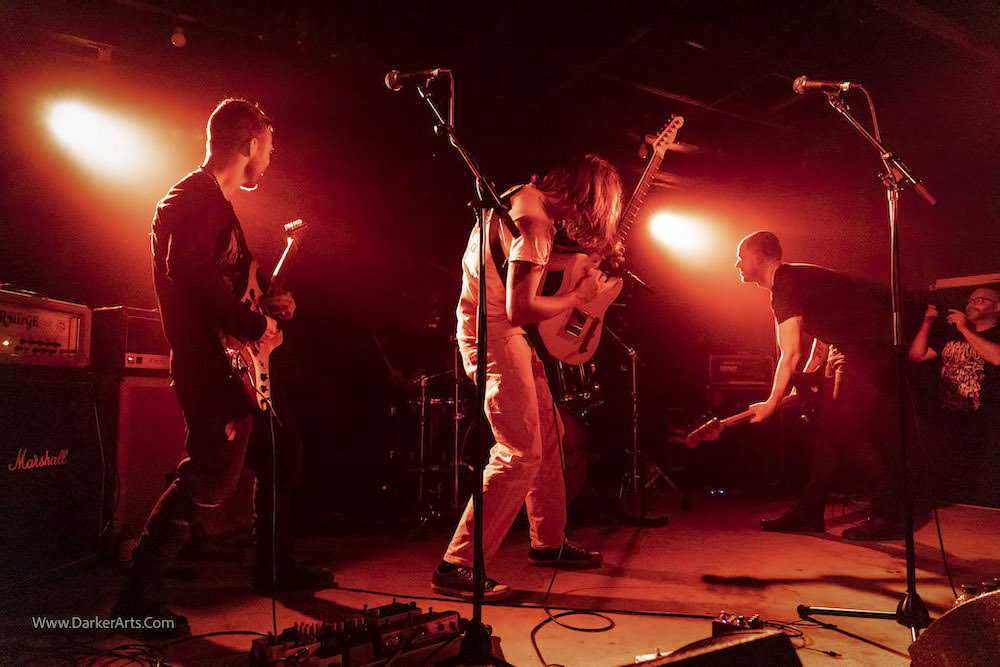
Demons of Noon at full blast in Wellington, December 2020. L-R Abraham Kunin, Scott Satherley, Jonathan Burgess (photo: Bruce Mackay, darkerarts.com)
HUP: You’re all in Auckland, I take it? Dealing with lockdown again?
Jonathan Burgess: Yep, we're locked down for the fourth time. HUP: And you pretty much emerged during lockdown number one... JB: Yep. HUP: ...but presumably you did not have your first rehearsal over Zoom? Scott Satherley: We were jamming for well over a year before we actually recorded the EP. It was quite a long time. JB: It was very much a thing that we all wanted to do because we enjoyed it. First and foremost, it was just a glorious thing to do on a Sunday afternoon. HUP: How did you guys get together? What was the impetus for forming the band? JB: A few of us have done quite a lot of mileage as professional musicians and there was a period a few years ago when my phone went a little bit quiet, and I didn't have that much music to do. Heavy music was always the first thing that I loved, and the music that I enjoy the most, and oddly the music that I performed the least. I got pulled into all sorts of things by all sorts of people but playing heavy stuff wasn’t ever one of them, so I decided to use my time to start something like that. Poetically, as I was a passenger driving through the Karangahake Gorge I called Joe. Joe was in London, we'd played together previously about 10 years ago but he’d moved to London to roast coffee. But Joe was on his way back! And it came to me in a vision that we’d start a band. Joe McElhinney: I still remember walking up the street in London, and how it all just worked out beautifully. We were listening to the same stuff at the same time, and going, “Alright! Let’s do something!” JB: Initially the band was called Gorge, because of the epiphany in the gorge, but people have already had that idea a few times now. A couple of the bands named Gorge seem to be quite good, and in a similar vein as well, so we got our own name which Scott came up with. And then we got Abe on board for our first jams, and just brought in riffs. We would just go underneath St Kevin’s Arcade and play really loud. Periodically Tom Anderson, who’s our George Martin, would stick his head in the door and ask for it to be heavier and we’d oblige. JMc: I think we’ve got that on a little iPhone demo somewhere. We're gonna have to sneak it in somewhere. HUP: Joe, what have you and Jonathan played before? Jonathan said you’d worked together years ago. JMc: Jon and I got linked up with a singer songwriter called Sarah Brown [who is, according to the NZ Music Commission artist directory, “a petite blonde bombshell possessed of a special way with heartfelt pop songs”]. It’s an echo of Jon's comments about not playing heavy music - playing a lot of stuff that wasn't what we were listening to. That was how we met. HUP: Scott, have you played with either of these guys before? SS: No, but I’ve been friends with Jonathan for a long time so I've seen his many bands play live. But this is the first time we’ve played together. HUP: Abe’s not on this call, so I can’t ask him, but did he have any connections playing with any of you before? JB: Abe and I went to music school together, and also flatted together at the time, and also played together in all sorts of bands. There's a period of two or three years where we were probably together 20 hours a day or something. 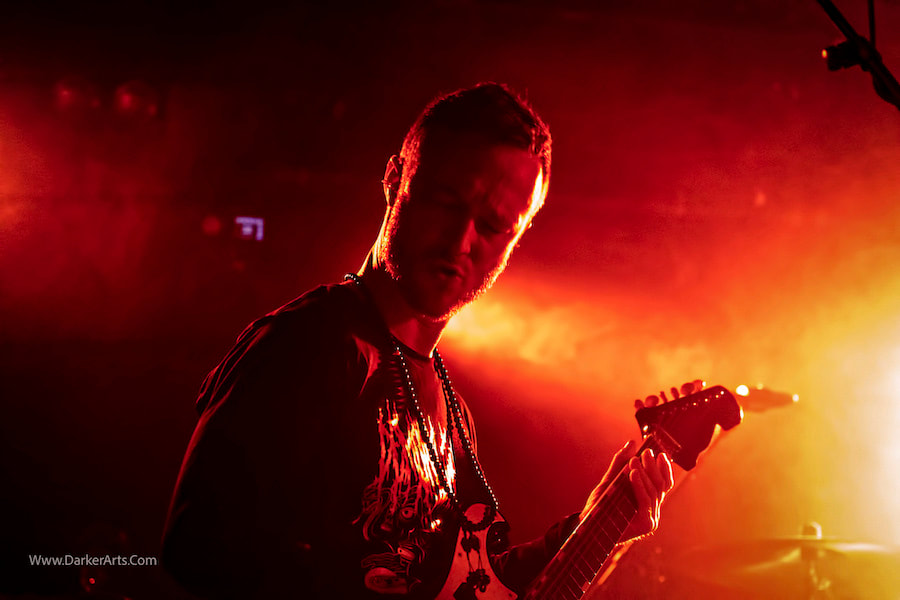
Abraham Kunin (photo: Bruce Mackay, darkerarts.com)
HUP: So had you two played heavy stuff together before now?
JB: No, but do you remember that phase where there were metal bands with a singer and then a specific screamer-person? Around emo times? When I met Abe, he was the screamer person in one of those bands. HUP: Was this back when metal bands also had a specific rap-person? JB: No, it was slightly after the rap period. Maybe the rap-people became the scream-people, because Abe can actually spit some verses. SS: He can. HUP: Can we look forward to hearing some of this on the next EP? JMc: No way. No. HUP: You recorded your EP, The Summoning, before playing any shows. Was the idea to be more of a 'studio band'? JB: We were a ‘play during the day at Whammy Bar’ band to write all the stuff. We were actually planning a release of our EP when lockdown happened. We just decided that we had to put it out, really, and we couldn't do shows or anything. HUP: And how was the recording process? JB: Fun fact - we recorded all the tunes instrumentally without vocals because it was too loud in the practice room. Then we created all the vocals afterwards over the instrumental takes, all written on top of the music. HUP: How many vocal takes did that all take? JB: It was pretty quick, we did them all in single sessions. JMc: ‘Mike’, the second song on the EP, was frighteningly fast. SS: One take, for some of the verses. JMc: Yeah. some of the verses were written pretty quickly and before any of us had even heard them, you know? Jonathan and Scott just went up, like ”right!”, and the first time we heard it was them delivering the take.
HUP: After you worked the vocal in over the top like that, how was it getting those songs to work live?
SS: Easy. Two practices. In my mind, by recording first you reach a larger audience in a way, and it's a good way of polishing your craft and fleshing the songs out a bit more. HUP: But not every band practice went perfectly, right? JB: In the final stages of preparing for the Beastwars show, about a couple of weeks out, we were rehearsing. We’re good friends with Simon, who plays bass in Head Like a Hole, and he's got a cool rehearsal setup at his place that he lets us use, very kindly. One Sunday afternoon we were shut down by noise control within, like, 20 minutes! How’s that response time? Someone must have called them the instant that we started. And this is the place that Head Like a Hole rehearses at! It has. Had. Some. Rehearsals. I think it’s the only time noise control’s been called there. SS: When Simon opened the doors, he was like [hurried throat-cutting gestures] ‘Gahh! Arhh!’ He was panicking, man. JB: We stopped straightaway. You don't see Simon ruffled, ever. And, I mean, we didn't want to get Head Like a Hole’s equipment confiscated! 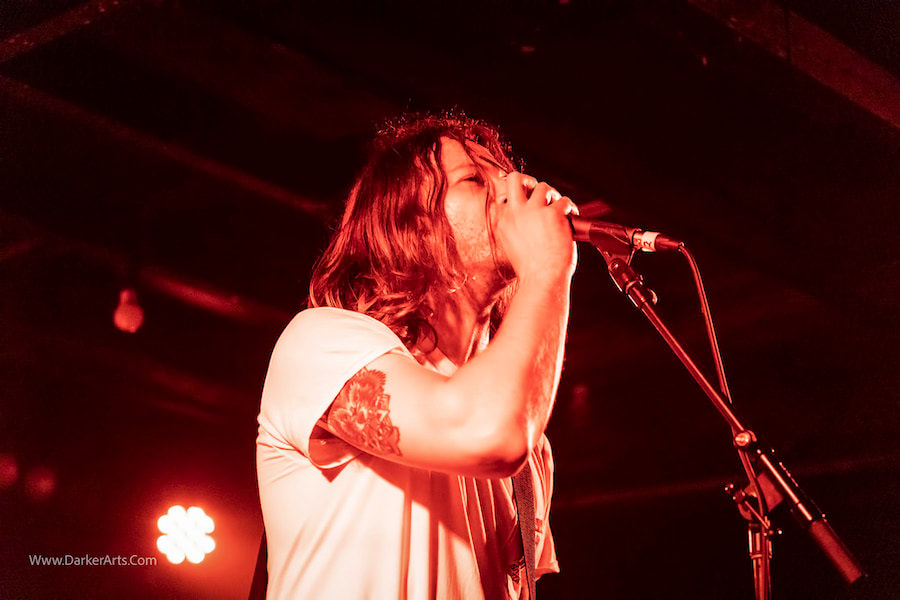
Scott Satherley (photo: Bruce Mackay, darkerarts.com)
HUP: Some pretty impressive connections are coming up very early in the story of Demons of Noon. How did you get the opening slot for Beastwars as your first gig? That’s a hell of a first grab!
JB: Isn't it just? We're just so thrilled that Nate [Beastwars’ drummer Nathan Hickey] found us and was willing to take a punt on us. Beastwars are legends, and they've reached a level of popularity that not many metal bands in New Zealand reach. I think they’re quite aware of that, and are careful to support the local scene. They had a tour coming up and they basically posted on social media, ‘who are the cool bands around at the moment?’, and some people posted our EP. Nate had a listen and loved it, and he got in touch. He said, ‘We've already booked up the Auckland show, but do you guys want to come down to Wellington?’ and we were like, ‘Hell yeah!’ I think he might have asked if we were a recording project or live project, haha! So that sped up the process nicely, having a good deadline to work towards. We were second out of three on the bill as well, just before Beastwars, and I think the relief was palpable for Nate when we showed up in Wellington and soundchecked. Like, ‘phew, they can play’.
HUP: How long was the set? You presumably had more than the three EP tracks.
JB: That we did. We were a polite opening band, we did a tight 30 minutes. Because no one wants opening bands to go on. But it also ended up as a much tighter sound than we'd been rehearsing. HUP: And what sort of reception did you get from the crowd? JB: They loved the hell out of it! It was quite a thing, being at San Fran with 500 Wellington metal fans singing along with the chorus to ‘Mike’. It was probably the first time that most of them were hearing it, but they were fully on board and singing along with that tune. It was perfect, just delivering ourselves directly to 500 Wellington metalheads - exactly the people that would love what we were doing. We couldn't have had a better first gig. There’s a real good scene there. HUP: Your second gig is with Bloodnut and Thousand Limbs on March 18. How did that come about? JB: Because Doug [McFarlane] from Bloodnut is just a similarly supportive member of the scene. I don’t even know when he listened to the recording, but he did and he loved it. Then jumped on the forums and shared it. JMc: The one, maybe the only, benefit of having an EP come out during lockdown is everyone's got a fuck-ton of time on their hands. They’re like, ‘great, something new and local, and it’s heavy music for heavy times’. So Doug jumped on it pretty soon after it came out. And you’re just always super pumped to hear anyone else who's into what you've done. That's why we asked them to come and do this show as well - to see each other do the stuff in the room, man. JB: It’s on the 18th, and we’ll be coming out of covid Level 2 on the 12th, I hope. SS: There’ll be fewer than 100 people so it’ll be fine. HUP: We’ve talked about the metal scene in Wellington being strong and long-lived. What’s the scene in Auckland like? JB: We’re going to find that out [laughs]. JMc: In my experience it is whatever you make it. You’ve got to pull in everyone who's close to you and try to get as much support as you can from people who know about you, through interviews like this one, or who get to hear you through the wire. Then it's great to be able to pull people out of the torpor of everyday life and into things like this. It’s hard to get a thing like this together these days as well, at least in my experience...given how long it's taken us to make this happen. SS: it's kind of like New Year’s Eve, you know? It’ll disappoint you no matter what. You’re like, man, this isn’t the night I imagined...now I’m tweaking out at 3am...there’s like, 10 people…[trails off] JB: Whammy and Wine Cellar next door are almost single-handedly holding up Auckland’s independent music scene at the moment. Cassette Nine’s gone more dance-y. JMc: Cassette Nine is more of a “show up with a USB stick rather than a fuckin’ instrument” kind of place now. 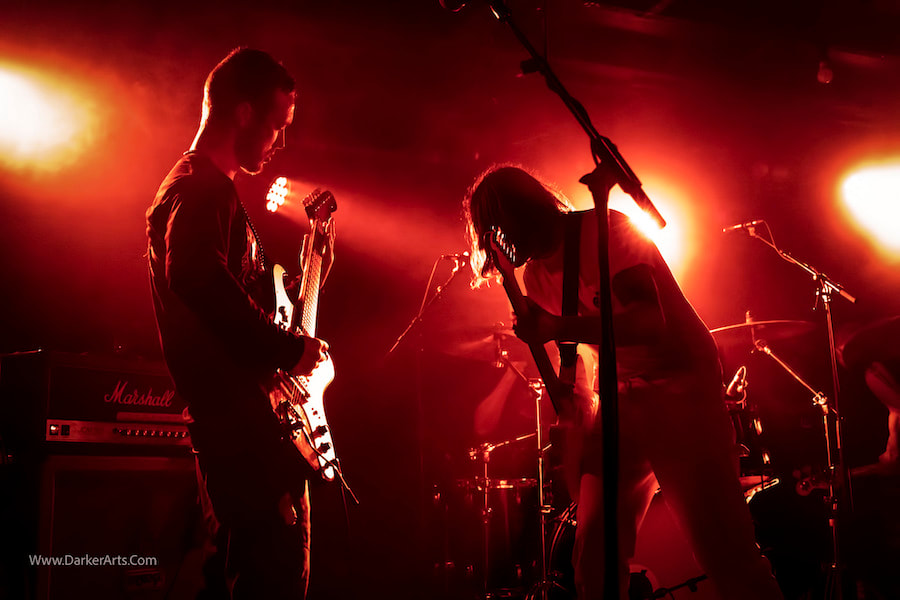
Abraham Kunin and Scott Satherley (photo: Bruce Mackay, darkerarts.com)
HUP: If you had a really good year or two, what would count as big success for you guys?
JMc: What’s that festival you wanna do in Europe, Jonathan? JB: The actual goal is to play at the Roadburn Festival in Tilburg, the Netherlands. It's amazing. In my mind, it's the best heavy festival in the world. It just brings together the coolest bands and I've discovered so many bands through it. They're about to do an online one that's completely free, so you can check it out. That's our Holy Grail, making it there. It’s a very ‘New Zealander’ sort of goal, I guess. SS: South By Southwest would be cool too. Imagine that, it’d be a dream. JB: The interim stepping stone is the Dark Mofo festival in Hobart, at MONA [Museum of Old and New Art] - the art gallery run by the genius gambling guy. HUP: Home of the poo machine! JB: Yes, but the day that I visited it wasn't running and I felt so ripped off. You go all the way to Hobart to see the poo machine, and the poo machine isn’t going. SS: The WHAT? JB: It’s the size of a room, and it digests stuff. I think they feed the waste from the cafe into it, maybe. And it digests the food and poos it out. SS: That’s beautiful. JMc: Like an anti-Bill Gates machine. SS: Surely someone’s made a music video, just of the human poo machine. JMc: What, like dropped a GoPro in the top of it? JB: ANYWAY, the cool thing about the genre is it's never going to hit a huge audience, but it’s a very loyal audience. The bands that make it can perpetually tour and sustain themselves off small venues. The Melvins of the world, and the Conans, will literally play Whammy Bar still, which is the same bar that we play at. Then they can just go and play at all the other Whammy Bars in the world. Roadburn, as part of a big tour, would be the ultimate thing for us. SS: This is definitely a full passion. We’ve all got jobs that we’re pretty deep into and there's no unrealistic expectation of what may happen. We do it because we like it and it's fun to hang out on Sundays. Hanging out with your friends and jamming is the best thing ever. It's cosmic, jamming like that, and it's so much fun, so it doesn't really matter if it goes nowhere. If it goes somewhere, that’s even better. HUP: Have you seen much international interest in the EP? JB: We're venturing into the world of the international doom forums at the moment. The EP’s doing the rounds. HUP: Have you discovered anything unexpected there? JB: Doom forums at all, I guess. JMc: Since having this EP out it's been interesting to see where it's been grabbed. This forum popped up out of nowhere, and by virtue of this one guy grabbing it, Jon uncovered some kind of ‘doom politics’ between these two channels. The guy who finds us first is Rob Hammer, and he’s like, ‘yeah, I do this for the love of it, and I love what you guys are doing, so let’s post this thing up’. Then immediately after that we get tapped by this other channel, and they’re like, ‘so here's the commercial opportunity - for 20 euro we’ll pin you here…’. They had splintered because Rob just wanted to follow his passion. The doom forum politics are an unexpected thing. JB: Yep, and you know what? Rob was the best of the two! We had better outcomes from the free, for-the-love guy. It was great, he asked ‘do you mind if I put your EP up on my channel?, and I said ,’cool, what do you need from us?’, and he says, ‘nothing at all, I've already bought the album’. He paid for it, and then put it up. HUP: The Summoning deserves a wide audience, so that’s awesome. Speaking of new audiences, what should people know about you if their first chance to see you is at Whammy Bar on the 18th? JB: A lot of people that I've talked to discount heavy metal as a genre because of the vocals. But that’s not us at all. Just let people know that we have, like, a really inclusive and welcoming metal vocal style. HUP: I’ll quote you on that.
Demons of Noon, Bloodnut and Thousand Limbs play Whammy Bar, Auckland, March 18.
The Summoning is on Bandcamp where you can stream it for free or buy the high-quality download for the fitting, and incredibly reasonable, price of $6.66. It’s also on Rob Hammer’s love-fuelled Doom Metal YouTube channel.
Arpie pinged some questions in the general vicinity of Adam Fulton, head honcho at Kirikiriroa Hamilton-based underground music conglomerate Real Vegan Cult ahead of their first ever two -day festival 'RVC Fest' this coming weekend.
Kia ora Adam! First of all tell us about Real Vegan Cult…what is it, why is it, what is its mission, and how long has it been a thing? RVC basically just started out as a gang of Chumz’s (Sam Chumz of Wizz Kids) when there were 6+ vegans all living in a compound down the north end of Victoria Street, Hamilton, back in 2016. These days it’s an outlet for our joint creative endeavours, primarily putting on shows and putting out music. It’s a lot easier and a lot more fun doing these things with 3-4 other people than doing it all yourself. We don’t really have a mission or plan to speak of, if someone comes up with a good idea we will all just try and develop it as best we can. At the moment we are mostly just working on a couple of shows, putting out a couple of records and a few other slightly more unusual projects. The first ever RVC Fest is this weekend March 12/13 at The Meteor, Hamilton. What is the concept behind it? Is it just a heap of bands you like or is there more to it than that? Are there many bands coming from around the country? RVC Fest started out as a final show for Hedge Fund Trader. When we started talking about who we would like to have on the bill, it became obvious that we could very easily make it a two-night event. There are a lot of really great Hamilton bands that almost never get to play in Hamilton (Raglan is not Hamilton), so the event is split pretty evenly between Hamilton bands and out-of-towners, but every single band on the bill are ones that I would happily go out and see play by themselves in the middle of winter. I know it’s a terrible question, putting you on the spot, but which bands are you especially looking forward to seeing? Maybe because you're seeing them for the first time or because they blew you away the first time…? First Move are the only band on the bill I have never managed to see live before. They have a sort of Midwest post-punk sound reminiscent of the likes of Rodan, Shipping News, Unwound etc. with this vocal delivery that is extremely evocative of inland provincial New Zealand. Piggery are a world-class live band, extremely heavy, groovy crust. LDR and Bridge Burner both have stuff coming out soon, so I am looking forward to hearing some new stuff from both of these bands. Do you hope it will become an annual event or is this it? We will see how it goes this weekend, but The Meteor crew are really good to deal with and seem keen to have something like this on annually. Will there be RVC merch? Do we need earplugs? There are a few people bringing their distros in from various parts of the country, so there should be a lot of good and obscure music there for people to go through. (I suspect earplugs would be a good idea - Ed) What’s your take on the local scene in Hamilton at the moment, what do we need more of/less of etc. Hamilton has been ahead of the rest of the country for ages now, things that started affecting the music scene here when I started playing live music (a lack of venues, this chasm between between local government and any sort of DIY music venture) seem to be affecting a lot of other regional centres more than I remember. Another thing would be arts funding in Hamilton. If you compare us here to somewhere like Palmerston North with The Stomach-a government funded venue, recording studio and rehearsal space-they have this organisation set up to remove the financial barriers to making art and music, as opposed to what we have going on in Hamilton (funding artists for specific events) which has just resulted in a glut of corporate art that wouldn’t seem out of place on a Vodafone commercial. Follow RVC Fest's FB event page to stay up to date with all details about the weekend's shenanigans. - Arpie
Arpie was fortunate enough to fire a few questions at The Datsuns drummer Ben Cole, to find out all about their brand new music, plans for touring, as well as get a few insights into the band's songwriting process and find out what's currently ripping it up on the turntable in the Cole household.
Congrats on the new single ‘Brain To Brain’! What can you tell us about it – what’s the song about/what inspired it, which of you wrote it, where and when was it recorded etc. Thanks man! It’s the first single off our new album coming out soon. Phil wrote the music for this one and Dolf wrote the vocals. I think it’s about being so close to some people in your life that you almost know what they’re gonna say before they say it, and how having that insight into someone ain’t necessarily something you enjoy. That’s my take on it anyhow! The video for the song has some dodgy backstreet scientician brain surgery going on which is pretty cool too. All in the name of more fidelity! And there’s an album due at the end of May too, ‘Eye To Eye.’ Presumably that was written and recorded during a disruptive year of lockdowns etc. Did that help or hinder in terms of the writing and recording process? Yes indeedy! New album May 25th I believe. Pretty exciting for us to have some new music coming out I gotta tell ya. This album was conceived and most of the music was recorded about 5 years or so ago actually. We wrote most of it at The Porch studio just outside Hamilton and recorded the drums and most of the bass and rhythm guitar at Roundhead studio in Auckland, then we went our separate ways and time got stretched and babies were born and lives got lived and it took us another couple of years to finish things off. By that stage some song parts needed changing so we changed ‘em, re-recorded some stuff and stuck it all together and we had another album. Easy as that! It might be a stupid question given the current situation across the world but are there any loose plans for shows/tours etc? Yeah, there’s plans for sure! Playing live is where it’s at for us so when we can make it happen we will. We’re working on it! What is the song writing process like in The Datsuns these days – who does what and how does it get from an idea into a fully-fledged song? When we get together these days time is usually something we want to make full use of, so everyone has already been sending demos to each other so we have an idea of the things we’re gonna work on. We try stuff out as a band and see what works and what doesn’t, change parts around, some things get thrown away, some things get inspired by other things and take a different tack, and some things turn out almost exactly like the demo. It really depends on what sounds good when we’re all playing together. How has that changed over the years? I think it’s gotten more considered maybe? When you’re first writing songs you tend to get really excited by new songs and bang together the fastest thing you can play, or something more at the limits of what you can do. The more you write and the more you think about and listen to music though, the less impressed you may be with something that’s just fast or whatever, and you tend to develop a wider appreciation of what makes a song a good song and what you like about music, and you have more ideas to draw on. I do still love fast shit tho! Are there many disagreements/robust debates when songwriting, in terms of agreeing what bits of songs/whole songs get the green light? Yeah, of course! One of the “downsides”, if ya wanna call it that, of everyone getting a wider musical view is there’s more ideas to be thrown in the pot, and you wanna try them all out if you can. Sometimes there’s more than one direction to take a song and picking which direction to go can get some heat under it for sure. You just gotta keep an open mind and see where it goes. What other music have you been listening to recently, any recommendations for us? Tropical Fuck Storm – A Laughing Death in Meatspace Marked Men – Fix my Brain KMRU – Peel Castlebeat – Castlebeat SLOW – Oceans Magugu & Famous Eno – Big Don Ranil - Ranil y su Conjunto Tropical and anything by Thee Oh Sees! At this point we asked a few questions about the very early days of the band back here in Hamilton, but Ben joined around 2006, replacing Matt Osment, so we were a bit wide of the mark there. Ben did tell us his high point of being in the band this far however... I’m sure the other fellas have their own (high point), but I loved playing The Big Day Out. That was always a dream of mine to play main stage. And of course traveling to so many cool places I never thought I would and meeting such an excellent assortment of people! Finally, in 10 years time, what do you envisage The Datsuns to be doing? At this point in history I think having any kind of assumptions about the future is probably a foolhardy endeavour! I would hope we will still be getting together and making music for like-minded individuals to soak in. * The Datsuns new album 'Eye to Eye' is out at the end of May, and you can pre-order your copy by clicking through to thedatsuns.com
Fans of post-punk fuzz merchant’s, Opposite Sex, are going to find plenty to love on their latest outing, High Drama. Everything is here, just bigger. The eery effects of twisted powerlines on guitar are still here, but they come with the crunching of a car crash. The vocals still bite, and the drumming can swing between understated to raucous. The opening track, Shoots Me Like a Knife, rockets out with Lucy Hunter’s singing, demanding and accusatory, buoyed along by frantic drumming from Tim Player. It’s a brilliant and caustic beginning to an album that takes the best things of 2016’s Hamlet and dials them up.
Hunter’s vocals are such an asset to the group; there is a lightness, even a sweetness to her voice that belies the strength in her lyrics. When paired with the cavalcade of screeching and droning that Reg Norris puts out on guitar, it’s the juxtaposition that creates an accessibility to the noisy and riotous instrumental. When the boys are left in charge of singing, like on Tumble Down/Mikhail, or the bass is heavier, it becomes darker again, a breathy horror sequence of peering around corners, which is exciting, though nerve-wrecking. Hunter pulls us back to safety. The demo of Dick on a Throne from 2016 is up on Opposite Sex’s bandcamp page, but the album version is a huge step forward. Norris’ brimming guitar is a near perfect stage for Hunter’s delivery, lighting up her revulsion and letting it simmer. It’s that layering again, a casualness in her voice, and lyrics like, “Stop staring at your dick, its gross/Don’t tell me how to sit, its gross,” that adds a sense of humour in what becomes a black comedy. The song moves from skin scraping on concrete to fist pumping peaks. The second half of the album perhaps doesn’t quite hold the magnitude of the first half. Owls Do Cry moves from sounding tried to nearly breaking apart, which is a helluva journey in eight or so minutes, but like Mondays, I don’t want to wake up that fast. Robotica is cute but doesn’t quite land as well as the opening track which is its best comparison point. Neither it, nor the beat poetry in a car crusher that is Nico, are must skip tracks, they’re just not to the same level as some others. This slightly off-kilter, sonically diverse album is genuinely fantastic and frightening. It’s like seeing sparks flying in a petrol station and that excitement is what drives the album forward. There will be plenty people eagerly waiting on this album, but it’s those opposites that will draw in new listeners; those contraries in Hunter’s voice and lyrics, Norris’ guitar-cum-wrecking yard and Player’s nous in balancing them on top of smashing hi-hats and snares. A raw and visceral delight. - Hp * 'High Drama' is released on Friday March 5th on Spik and Span Records |
Archives
July 2022
Categories |
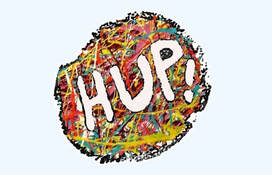
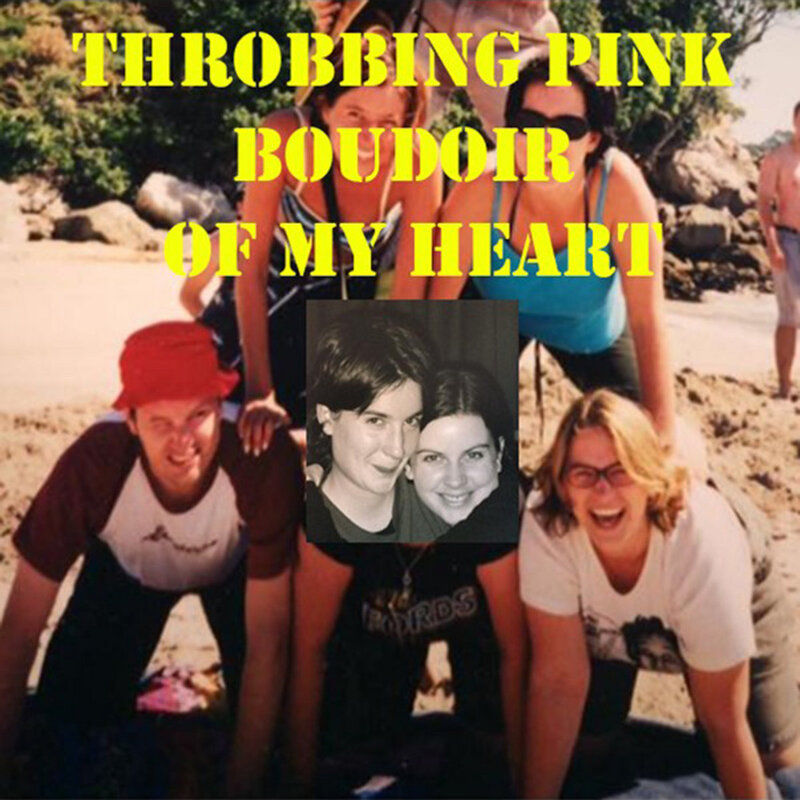
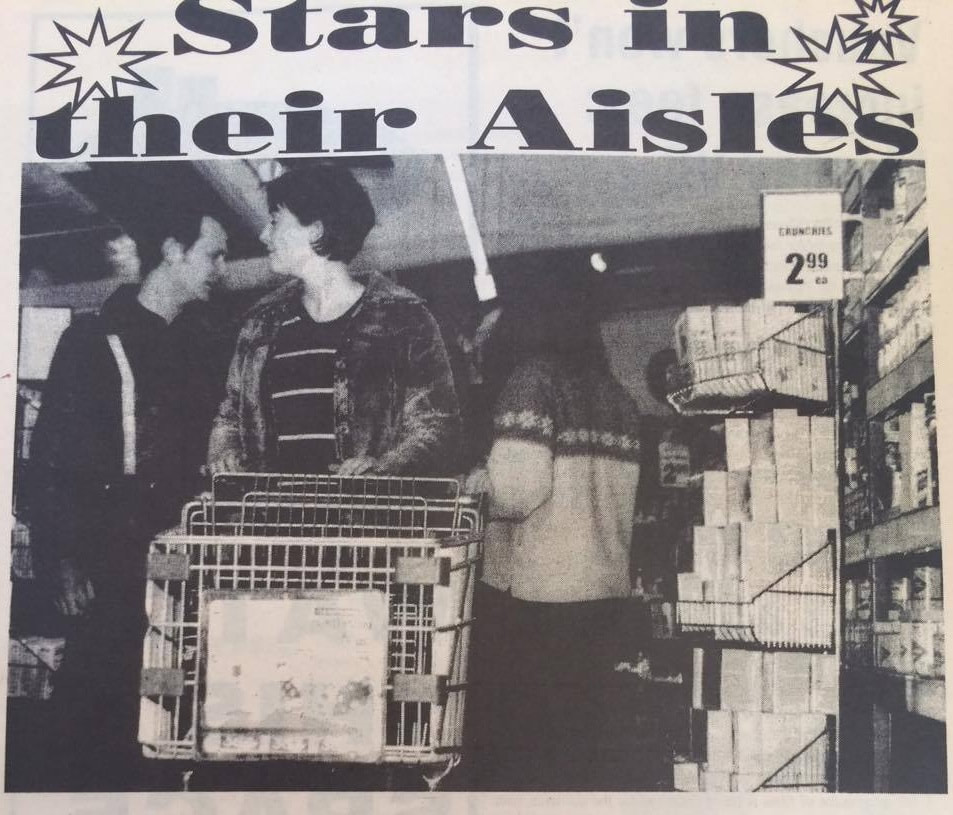
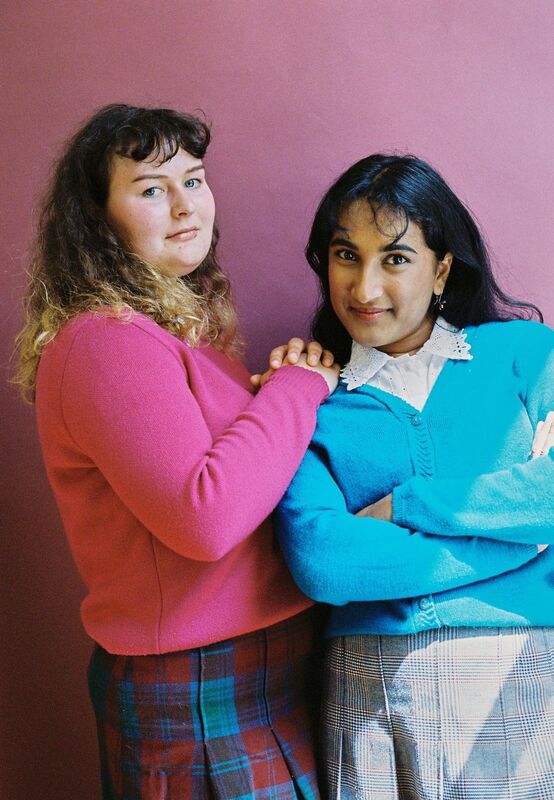
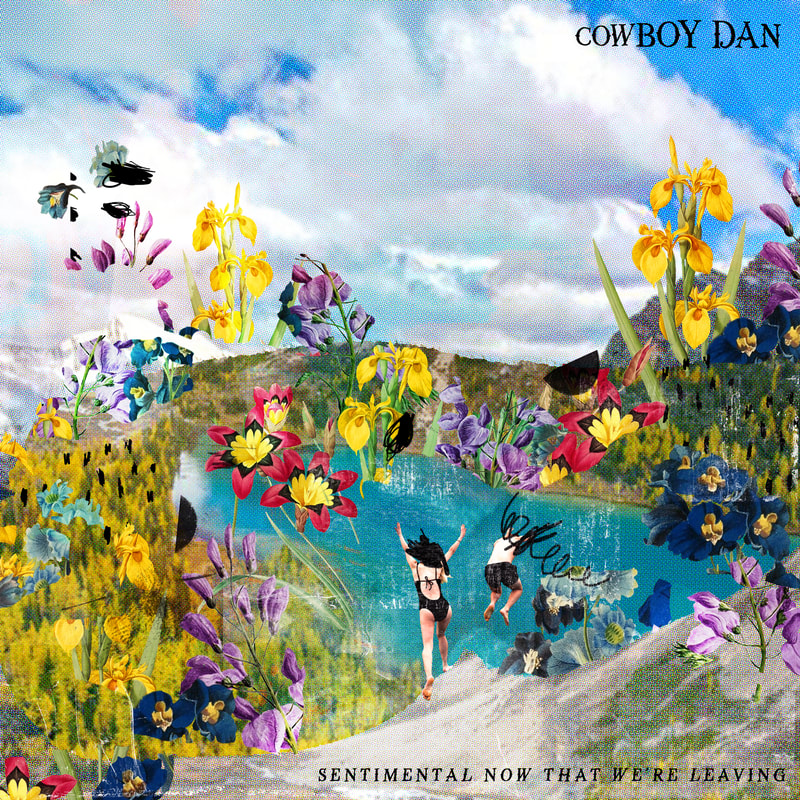
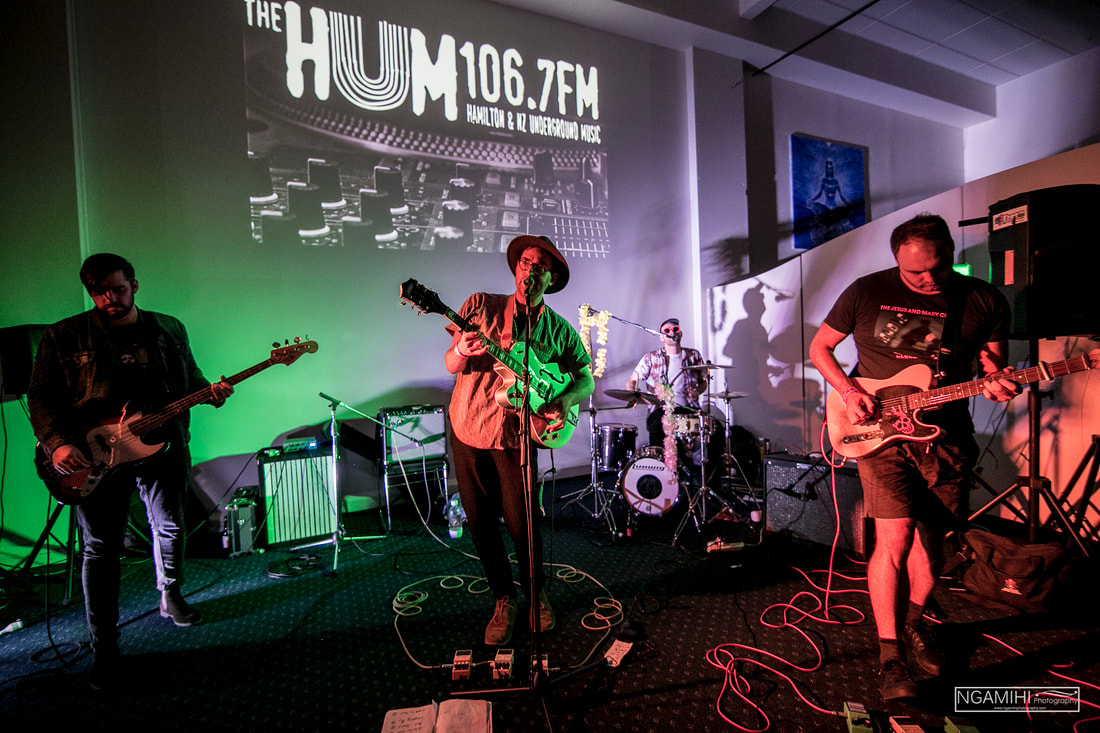

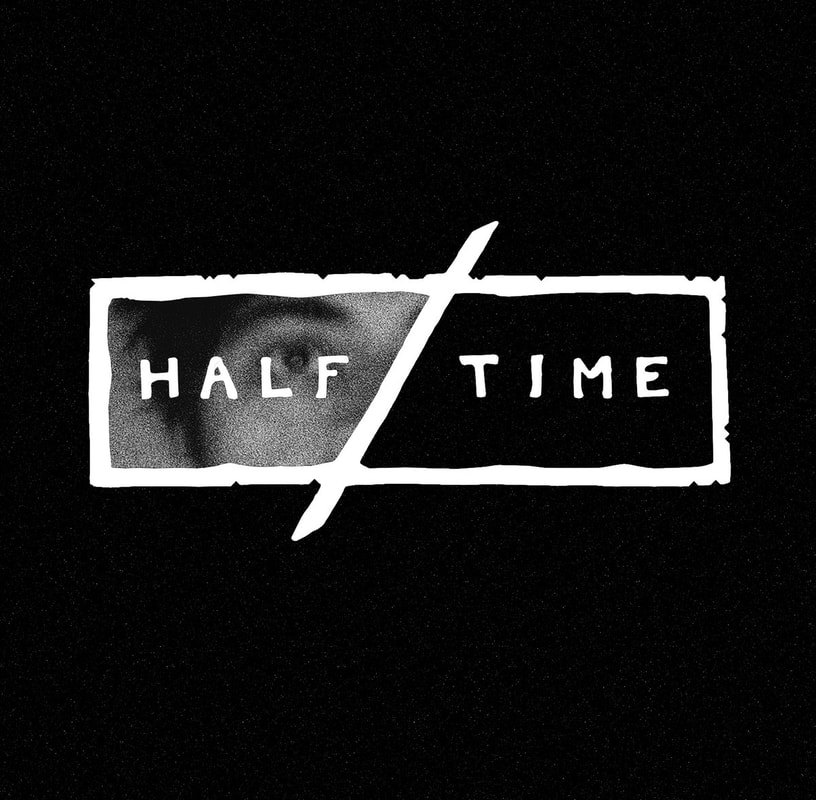
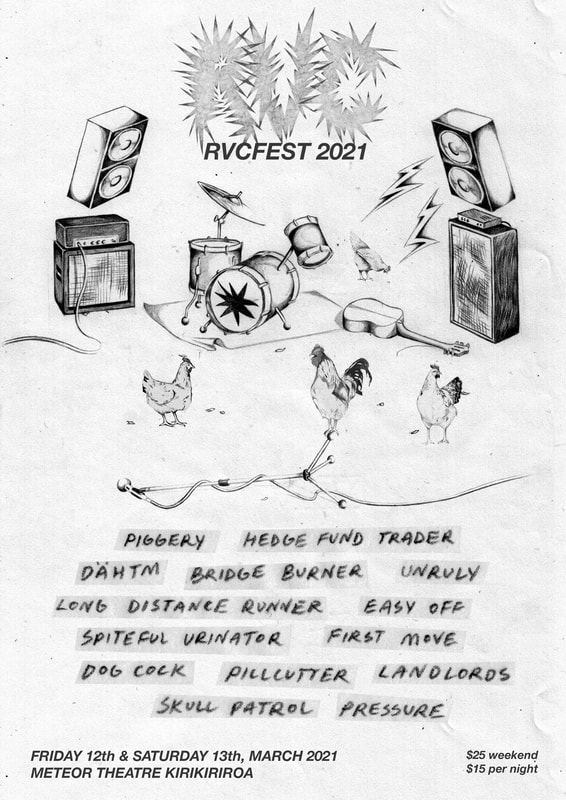
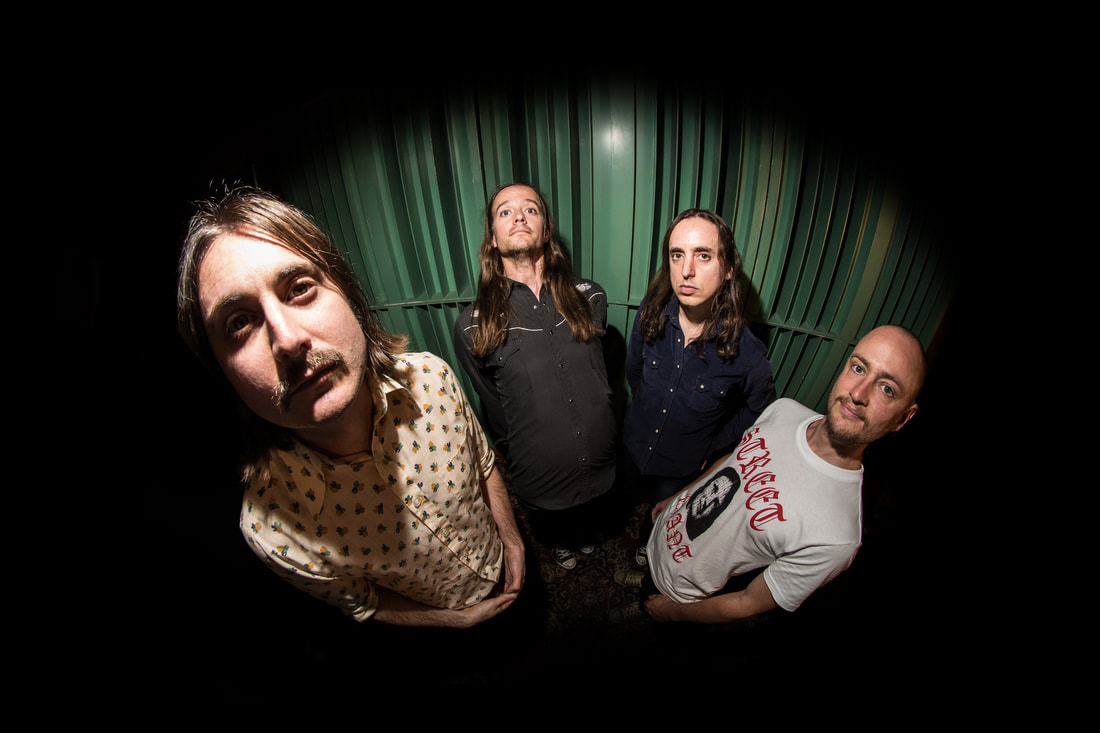
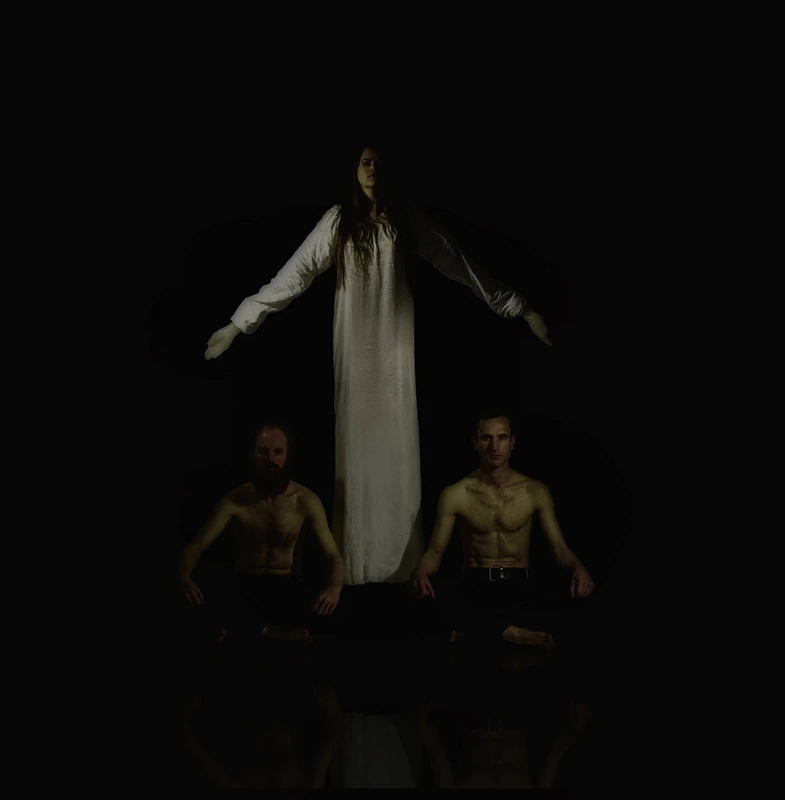
 RSS Feed
RSS Feed
